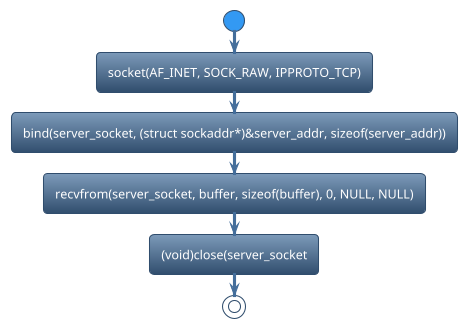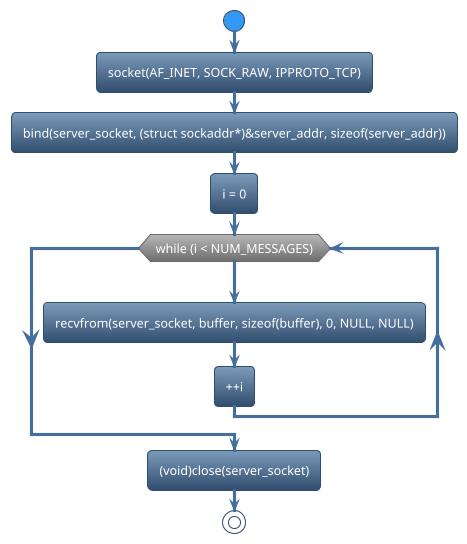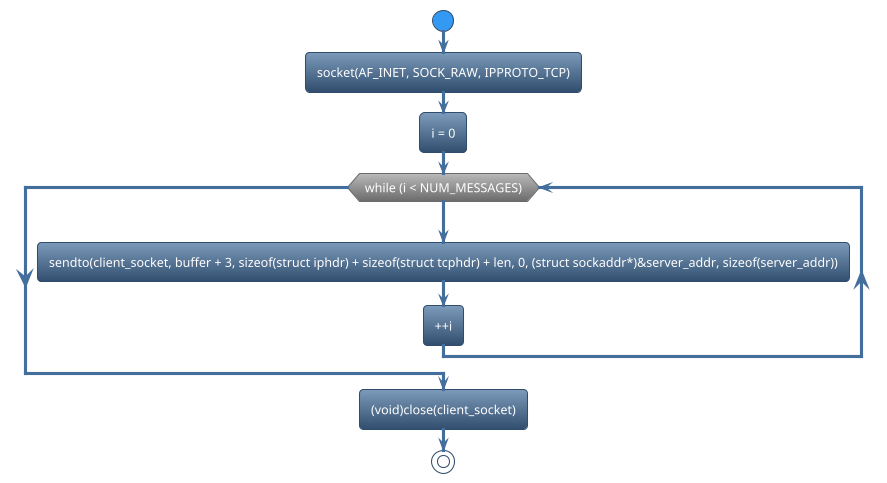Basic example raw af inet tcp server and client
In this program, you are going to learn
How to create a Socket ?
How to bind a socket ?
How to send a data ?
How to recv a data ?
Topics in this section,
Topics in this section,
Let us answer few basic questions in this socket
What does socket(AF_INET, SOCK_RAW, IPPROTO_TCP) do?
See Answer
This call creates a raw socket in the AF_INET address family for direct access to TCP packets.
When is it appropriate to use SOCK_RAW sockets with TCP?
See Answer
It’s suitable for tasks like packet capturing, network monitoring, or implementing custom protocols where direct access to TCP packets is needed.
Can this socket be used for regular TCP communication?
See Answer
While technically possible, it’s not recommended for regular communication due to increased complexity and potential security risks.
How does a raw TCP socket differ from a regular TCP socket?
See Answer
A raw TCP socket provides direct access to the TCP layer, allowing for manual packet manipulation, whereas regular TCP sockets handle packet details internally.
What are some use cases for raw TCP sockets?
See Answer
Use cases include network sniffing, packet analysis, security auditing, and developing custom network protocols.
How can I capture and analyze TCP packets using raw sockets?
See Answer
You can use the raw socket to capture TCP packets and analyze them using packet analysis tools like Wireshark.
Is error checking needed after creating the socket?
See Answer
Yes, checking for errors ensures that the socket is created successfully before proceeding with further operations.
Why is it important to check the return value of sendto() and recvfrom() in socket programming?
See Answer
It detects issues such as network errors or closed connections.

There are many functions used in socket. We can classify those functions based on functionalities.
Create Socket
Bind Socket
Recvfrom data_packet
Sendto data_packet
Close socket
socket()is used to create a new socket. For example,
server_socket = socket(AF_INET, SOCK_RAW, IPPROTO_TCP);
bind()is used to associate the socket with a specific address and port. For example,
ret = bind(server_socket, (struct sockaddr*)&server_addr, sizeof(server_addr));
recvfromis commonly used with sockets, where communication is connectionless. it provides information about the source (sender) of the data, including the sender’s IP address and port number. For example,
len = recvfrom(server_socket, buffer, sizeof(buffer), 0, NULL, NULL);
closeis used to close the socket To free up system resources associated with the socket. For example,
(void)close(server_socket);
See the full program below,
#include <stdio.h>
#include <stdlib.h>
#include <string.h>
#include <unistd.h>
#include <arpa/inet.h>
#include <netinet/ip.h>
#include <netinet/tcp.h>
#include <ctype.h>
#define PORT 8080
#define BUFFER_SIZE 1024
void recv_data(
const char *packet,
size_t length)
{
int header_size, i;
char c;
header_size = sizeof(struct iphdr) +
sizeof(struct tcphdr);
printf("Receivedpacket:");
for (i = header_size; i < length; ++i) {
c = packet[i];
if (isprint(c) || c == '\n'
|| c == '\r') {
printf("%c", c);
}
}
printf("\n");
}
void validate_convert_addr(
char *ip_str,
struct sockaddr_in *sock_addr)
{
if (ip_str == NULL) {
perror("Invalid ip_str\n");
exit(EXIT_FAILURE);
}
if (sock_addr == NULL) {
perror("Invalid sock_addr\n");
exit(EXIT_FAILURE);
}
printf("IP Address: %s\n", ip_str);
if (inet_pton(AF_INET, ip_str,
&(sock_addr->sin_addr)) <= 0) {
perror("Invalid address\n");
exit(EXIT_FAILURE);
}
}
int main(int argc, char *argv[])
{
int server_socket;
int len, ret;
struct sockaddr_in
server_addr;
char buffer[BUFFER_SIZE];
if (argc != 2) {
printf("%s<ip-addr>\n",
argv[0]);
exit(EXIT_FAILURE);
}
server_socket = socket(AF_INET,
SOCK_RAW,
IPPROTO_TCP);
if (server_socket < 0) {
perror("Socket creation failed");
exit(EXIT_FAILURE);
}
server_addr.sin_family = AF_INET;
server_addr.sin_port = htons(PORT);
validate_convert_addr(argv[1],
&server_addr);
ret = bind(server_socket,
(struct sockaddr*)&server_addr,
sizeof(server_addr));
if (ret < 0) {
perror("Bind failed");
(void)close(server_socket);
exit(EXIT_FAILURE);
}
printf("Serverlisten\n");
len = recv(server_socket,
buffer, sizeof(buffer), 0);
if (len < 0) {
perror("Receive failed");
(void)close(server_socket);
exit(EXIT_FAILURE);
}
recv_data(buffer, len);
(void)close(server_socket);
return 0;
}
$ gcc -o server server.c
$ sudo ./server 127.0.0.1
IP Address: 127.0.0.1
Serverlisten
Receivedpacket:_Hello from client!

There are many functions used in socket. We can classify those functions based on functionalities.
Create Socket
Sendto data_packet
Close socket
socketis used to create a new socket. For example,
client_socket = socket(AF_INET, SOCK_RAW, IPPROTO_TCP);
sendtois used to send the encoded message to the specified server address and port using a socket. For example,
ret = sendto(client_socket, buffer + 3, sizeof(struct iphdr) + sizeof(struct tcphdr) + len, 0, (struct sockaddr*)&server_addr, sizeof(server_addr));
closeis used to close the socket To free up system resources associated with the socket. For example,
(void)close(client_socket);
See the full program below,
#include <stdio.h>
#include <stdlib.h>
#include <string.h>
#include <unistd.h>
#include <arpa/inet.h>
#include <netinet/ip.h>
#include <netinet/tcp.h>
#define SERVER_IP "127.0.0.1"
#define PORT 8080
#define BUFFER_SIZE 1024
void craft_tcp_packet(
char *buffer,
const char *data,
size_t data_len)
{
struct iphdr *ip_header;
struct tcphdr *tcp_header;
ip_header = (struct iphdr *)buffer;
ip_header->ihl = 5;
ip_header->version = 4;
ip_header->tos = 0;
ip_header->tot_len = sizeof(struct iphdr) +
sizeof(struct tcphdr) + data_len;
ip_header->id = htons(54321);
ip_header->frag_off = 0;
ip_header->ttl = 255;
ip_header->protocol = IPPROTO_TCP;
ip_header->check = 0;
ip_header->saddr = INADDR_ANY;
ip_header->daddr = INADDR_ANY;
tcp_header = (struct tcphdr *)
(buffer + sizeof(struct iphdr));
tcp_header->source = htons(12345);
tcp_header->dest = htons(PORT);
tcp_header->seq = 0;
tcp_header->ack_seq = 0;
tcp_header->doff = 5;
tcp_header->fin = 0;
tcp_header->syn = 0;
tcp_header->rst = 0;
tcp_header->psh = 1;
tcp_header->ack = 0;
tcp_header->urg = 0;
tcp_header->window = htons(5840);
tcp_header->check = 0;
tcp_header->urg_ptr = 0;
memcpy(buffer +
sizeof(struct iphdr) +
sizeof(struct tcphdr), data,
data_len);
}
void validate_convert_addr(
char *ip_str,
struct sockaddr_in *sock_addr)
{
if (ip_str == NULL) {
perror("Invalid ip_str\n");
exit(EXIT_FAILURE);
}
if (sock_addr == NULL) {
perror("Invalid sock_addr\n");
exit(EXIT_FAILURE);
}
printf("IP Address: %s\n", ip_str);
if (inet_pton(AF_INET, ip_str,
&(sock_addr->sin_addr)) <= 0) {
perror("Invalid address\n");
exit(EXIT_FAILURE);
}
}
int main(int argc, char *argv[])
{
int client_socket;
int i, len, ret;
struct sockaddr_in
server_addr;
char buffer[BUFFER_SIZE];
const char *message =
"Hello from client!";
if (argc != 2) {
printf("%s<ip-addr>\n",
argv[0]);
exit(EXIT_FAILURE);
}
client_socket = socket(AF_INET,
SOCK_RAW,
IPPROTO_TCP);
if (client_socket < 0) {
perror("Socket creation failed");
exit(EXIT_FAILURE);
}
server_addr.sin_family = AF_INET;
server_addr.sin_port = htons(PORT);
validate_convert_addr(argv[1],
&server_addr);
len = strlen(message);
craft_tcp_packet(buffer,
message, len);
strcpy(buffer + 3, message);
ret = sendto(client_socket, buffer + 3,
sizeof(struct iphdr) +
sizeof(struct tcphdr) + len,
0, (struct sockaddr *)&server_addr,
sizeof(server_addr));
if (ret < 0) {
perror("Send failed");
(void)close(client_socket);
exit(EXIT_FAILURE);
}
printf("Sentpacket:%s\n", message);
(void)close(client_socket);
return 0;
}
$ gcc -o client client.c
$ sudo ./client 127.0.0.1
IP Address: 127.0.0.1
Sentpacket:Hello from client!

There are many functions used in socket. We can classify those functions based on functionalities.
Create Socket
Bind Socket
Recvfrom data_packet
Close socket
socket()is used to create a new socket. For example,
server_socket = socket(AF_INET, SOCK_RAW, IPPROTO_TCP);
bind()is used to associate the socket with a specific address and port. For example,
ret = bind(server_socket, (struct sockaddr*)&server_addr, sizeof(server_addr));
recvfromis commonly used with sockets, where communication is connectionless. it provides information about the source (sender) of the data, including the sender’s IP address and port number. For example,
len = recvfrom(server_socket, buffer, sizeof(buffer), 0, NULL, NULL);
closeis used to close the socket To free up system resources associated with the socket. For example,
(void)close(server_socket);
See the full program below,
#include <stdio.h>
#include <stdlib.h>
#include <string.h>
#include <unistd.h>
#include <arpa/inet.h>
#include <netinet/ip.h>
#include <netinet/tcp.h>
#include <ctype.h>
#define PORT 8081
#define BUFFER_SIZE 1024
#define NUM_MESSAGES 10
void recv_data(
const char *packet,
size_t length)
{
int header_size, i;
char c;
header_size = sizeof(struct iphdr) +
sizeof(struct tcphdr);
printf("Received: ");
for (i = header_size; i < length; ++i) {
c = packet[i];
if (isprint(c) || c == '\n' || c == '\r') {
printf("%c", c);
}
}
printf("\n");
}
void validate_convert_addr(
char *ip_str,
struct sockaddr_in *sock_addr)
{
if (ip_str == NULL) {
perror("Invalid ip_str\n");
exit(EXIT_FAILURE);
}
if (sock_addr == NULL) {
perror("Invalid sock_addr\n");
exit(EXIT_FAILURE);
}
printf("IP Address: %s\n", ip_str);
if (inet_pton(AF_INET, ip_str,
&(sock_addr->sin_addr)) <= 0) {
perror("Invalid address\n");
exit(EXIT_FAILURE);
}
}
int main(int argc, char *argv[])
{
int server_socket;
int i, ret, len;
struct sockaddr_in
server_addr;
char buffer[BUFFER_SIZE];
if (argc != 2) {
printf("%s<ip-addr>",
argv[0]);
exit(EXIT_FAILURE);
}
server_socket = socket(AF_INET,
SOCK_RAW,
IPPROTO_TCP);
if (server_socket < 0) {
perror("Socket creation failed");
exit(EXIT_FAILURE);
}
server_addr.sin_family = AF_INET;
server_addr.sin_port = htons(PORT);
validate_convert_addr(argv[1],
&server_addr);
ret = bind(server_socket,
(struct sockaddr*)&server_addr,
sizeof(server_addr));
if (ret < 0) {
perror("Bind failed");
(void)close(server_socket);
exit(EXIT_FAILURE);
}
printf("Server listening\n");
i = 0;
while (i < NUM_MESSAGES) {
len = recv(server_socket,
buffer, sizeof(buffer), 0);
if (len < 0) {
perror("Receive failed");
break;
}
recv_data(buffer, len);
++i;
}
(void)close(server_socket);
return 0;
}
$ gcc -o server server.c
$ sudo ./server 127.0.0.1
IP Address: 127.0.0.1
Server listening
Received: _Hello from client!
Received: _Hello from client!
Received: _Hello from client!
Received: _Hello from client!
Received: _Hello from client!
Received: _Hello from client!
Received: _Hello from client!
Received: _Hello from client!
Received: _Hello from client!
Received: _Hello from client!

There are many functions used in socket. We can classify those functions based on functionalities.
Create Socket
Sendto data_packet
Close socket
socketis used to create a new socket. For example,
client_socket = socket(AF_INET, SOCK_RAW, IPPROTO_TCP);
sendtois used to send the encoded message to the specified server address and port using a socket. For example,
ret = sendto(client_socket, buffer + 3, sizeof(struct iphdr) + sizeof(struct tcphdr) + len, 0, (struct sockaddr*)&server_addr, sizeof(server_addr));
closeis used to close the socket To free up system resources associated with the socket. For example,
(void)close(server_socket);
See the full program below,
#include <stdio.h>
#include <stdlib.h>
#include <string.h>
#include <unistd.h>
#include <arpa/inet.h>
#include <netinet/ip.h>
#include <netinet/tcp.h>
#define BUFFER_SIZE 1024
#define NUM_MESSAGES 10
#define PORT 8081
void validate_convert_addr(
char *ip_str,
struct sockaddr_in *sock_addr)
{
if (ip_str == NULL) {
perror("Invalid ip_str\n");
exit(EXIT_FAILURE);
}
if (sock_addr == NULL) {
perror("Invalid sock_addr\n");
exit(EXIT_FAILURE);
}
printf("IP Address: %s\n", ip_str);
if (inet_pton(AF_INET, ip_str,
&(sock_addr->sin_addr)) <= 0) {
perror("Invalid address\n");
exit(EXIT_FAILURE);
}
}
void craft_tcp_packet(
char *buffer,
const char *data,
size_t data_len)
{
struct iphdr *ip_header;
struct tcphdr *tcp_header;
int i;
ip_header = (struct iphdr *)buffer;
ip_header->ihl = 5;
ip_header->version = 4;
ip_header->tos = 0;
ip_header->tot_len = sizeof(struct iphdr) +
sizeof(struct tcphdr)
+ data_len;
ip_header->id = htons(54321);
ip_header->frag_off = 0;
ip_header->ttl = 255;
ip_header->protocol = IPPROTO_TCP;
ip_header->check = 0;
ip_header->saddr = INADDR_ANY;
ip_header->daddr = INADDR_ANY;
tcp_header = (struct tcphdr *)
(buffer + sizeof(struct iphdr));
tcp_header->source = htons(12345);
tcp_header->dest = htons(PORT) ;
tcp_header->seq = 0;
tcp_header->ack_seq = 0;
tcp_header->doff = 5;
tcp_header->fin = 0;
tcp_header->syn = 0;
tcp_header->rst = 0;
tcp_header->psh = 1;
tcp_header->ack = 0;
tcp_header->urg = 0;
tcp_header->window = htons(5840);
tcp_header->check = 0;
tcp_header->urg_ptr = 0;
memcpy(buffer + sizeof(struct iphdr) +
sizeof(struct tcphdr), data, data_len);
}
int main(int argc, char *argv[])
{
int client_socket;
int ret, i;
int len;
struct sockaddr_in
server_addr;
char buffer[BUFFER_SIZE];
const char *message =
"Hello from client!";
if (argc != 2) {
printf("%s<ip-addr>\n",
argv[0]);
exit(EXIT_FAILURE);
}
client_socket = socket(AF_INET,
SOCK_RAW,
IPPROTO_TCP);
if (client_socket < 0) {
perror("Socket creation failed");
exit(EXIT_FAILURE);
}
server_addr.sin_family = AF_INET;
server_addr.sin_port = htons(PORT);
validate_convert_addr(argv[1],
&server_addr);
len = strlen(message);
craft_tcp_packet(buffer,
message, len);
strcpy(buffer + 3, message);
i = 0;
while (i < NUM_MESSAGES) {
ret = sendto(client_socket,
buffer + 3,
sizeof(struct iphdr) +
sizeof(struct tcphdr) + len,
0, (struct sockaddr *)&server_addr,
sizeof(server_addr));
if (ret < 0) {
perror("Send failed");
(void)close(client_socket);
exit(EXIT_FAILURE);
}
printf("Sentpacket: %s\n",
message);
++i;
}
(void)close(client_socket);
return 0;
}
$ gcc -o client client.c
$ sudo ./client 127.0.0.1
IP Address: 127.0.0.1
Sentpacket: Hello from client!
Sentpacket: Hello from client!
Sentpacket: Hello from client!
Sentpacket: Hello from client!
Sentpacket: Hello from client!
Sentpacket: Hello from client!
Sentpacket: Hello from client!
Sentpacket: Hello from client!
Sentpacket: Hello from client!
Sentpacket: Hello from client!
Default Domain:
By default, the socket is configured to work in the
AF_INETdomain, handling all types of network data.
Additional Domain Support:
We expand the socket’s capabilities to also function in the
PF_INETdomain, allowing it to operate similarly toAF_INET.
Socket Creation:
We set up a network connection point known as a socket using
socket(PF_INET, SOCK_RAW, IPPROTO_TCP).
Working Scenario:
Despite the change in domain to
PF_INET, the socket continues to operate the same way, handling general network data.
Socket API |
Learning |
|---|---|
socket |
Create a new socket |
recvfrom |
It provides information about the source (sender) of the data, including the sender’s IP address and port number. |
sendto |
Send the encoded message to the specified server address and port using a socket. |
Previous topic
Current topic
Next topic
Other sockets
Other IPCs